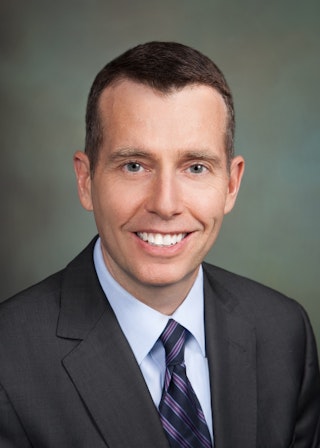Improving Outcomes Through Technology
Although ideologies will remain, millennials will bring a greater use of technology and data to the public sector. David Plouffe believes the resulting government will be more user-friendly and have a greater reach.
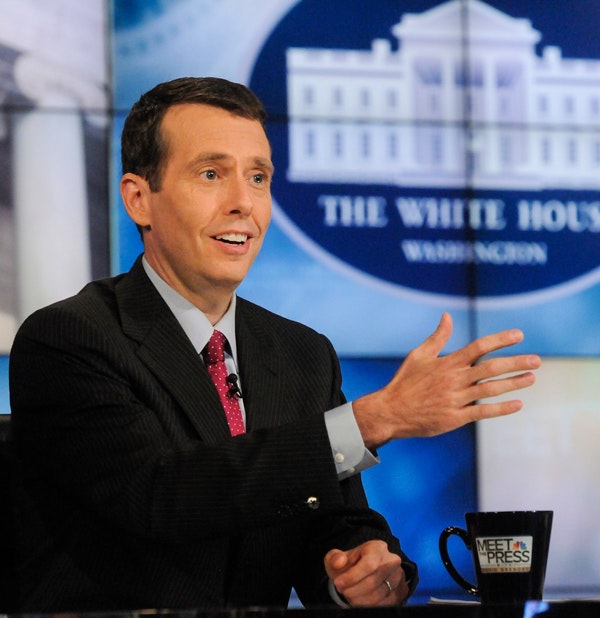 David Plouffe appears on Meet the Press in Washington D.C., Sunday, June 17, 2012. (William B. Plowman/NBC/NBC NewsWire via Getty Images)
David Plouffe appears on Meet the Press in Washington D.C., Sunday, June 17, 2012. (William B. Plowman/NBC/NBC NewsWire via Getty Images)
David Plouffe spearheaded Barack Obama’s 2008 presidential campaign, and later served as a White House adviser. Now an adviser to Uber, Plouffe’s career has depended upon understanding social trends. The Democrat spoke recently with Andrew Kaufmann, digital editor of The Catalyst, and William McKenzie, editor of The Catalyst, about the impact millennials are having – and will continue to have far into the future.
How do you see millennials setting the national agenda?
This group intends to make their mark for themselves and the world at an early stage in life. They are very global in their perspective. The world is smaller to them than it was for my generation. They are going to have a very diverse set of views about how and where you can set the agenda and bring about change.
This generation also is not content to wait their turn. You will see more of them interested in public service and running for office themselves.
They also value non-profit work. They think there are places where you can scale change pretty quickly.
In terms of values, how do you think millennials may shift how we look at politics? For example, polls that show they look at the issue of immigration differently from seniors. The same is true with same-sex marriage.
First, one concern is how involved they will be in politics and how much they think it matters. It is important that everybody involved in public service today articulate why politics and government, as frustrating as they can be at times, matter so much. There are very few things more important in the world.
One concern is how involved [millennials] will be in politics and how much they think it matters. It is important that everybody involved in public service today articulate why politics and government, as frustrating as they can be at times, matter so much.
As far as their values go, millennials tend to be more socially liberal and global. They may be more fiscally conservative so it will be interesting for them growing up in an America that is much different than my generation or previous generations.
They will be very focused and faster with technology and data, so all the changes coming to our economy will seem more familiar to them than older generations. But how will they change over time? How we feel about things when we are 21 can be different from how we feel when we are 51. It will be fascinating to watch those changes.
Millennials are known for thinking innovatively and attacking problems aggressively, often through technology. Will there be a tangible change in politics and campaigns because of that?
They think Internet first, social media first, data first.
Whether it is politics, government, or business, their instinct is: Can we measure something? Can we better the user experience?
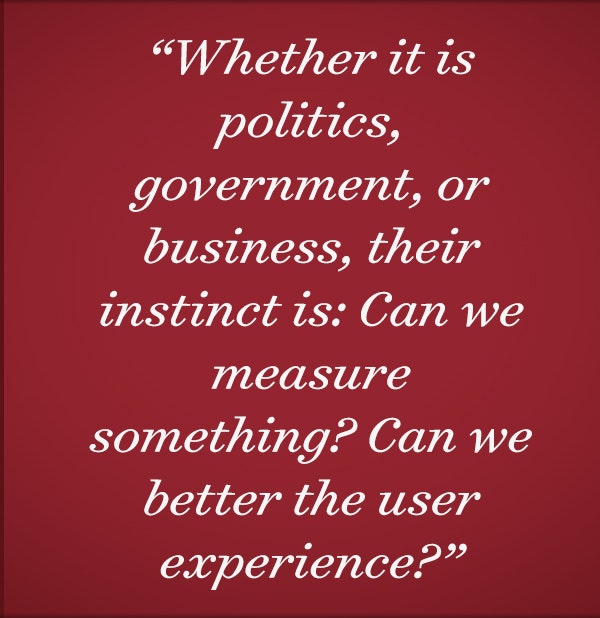
That will be helpful, by the way. Government is trying to innovate, but people’s experience with government is not the same as when they are on Facebook or shopping on Amazon. Ultimately, that is what people desire.
Technology isn’t just something to entertain us, but it can dramatically improve the user experience and improve outcomes. That orientation is ingrained in how millennials think.
Will that carry over when millennials start taking office? Or do you see the entrenched practice of governing remaining as it is now?
They will bring change, both in government and in evaluating private sector enterprises.
For instance, with Uber younger politicians who have used the service tend to have familiarity with platforms like Uber and Airbnb. They just have a greater understanding of them and that regulations need to be adjusted to permit their use, as opposed to fitting new technology into old regulations.
Millennials are going to challenge the way things have been done previously. You are going to question things if your interaction with government and regulations about how you use technology are inconsistent with how you live the rest of your life.
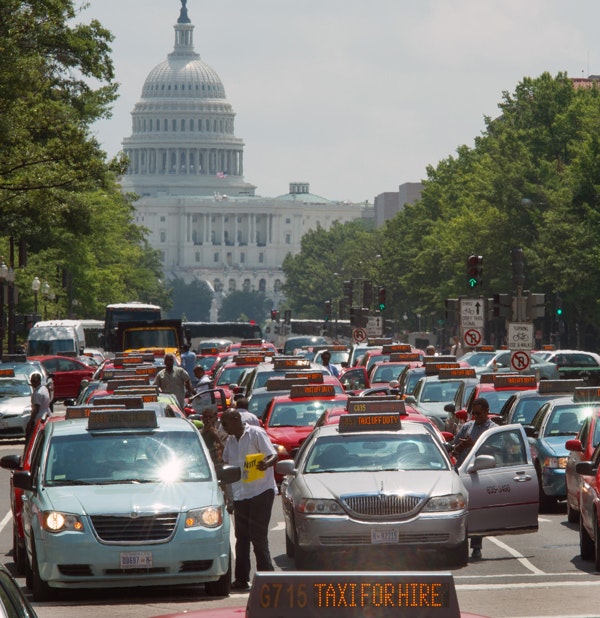 As lawmakers discuss ride sharing services, Washington, D.C. taxi drivers park their cars and honk the horn in protest of the services on Pennsylvania Avenue on June 24, 2014. (Paul J. Richards/AFP/Getty Images)
As lawmakers discuss ride sharing services, Washington, D.C. taxi drivers park their cars and honk the horn in protest of the services on Pennsylvania Avenue on June 24, 2014. (Paul J. Richards/AFP/Getty Images)
Will that affect government itself?
I think so. When dealing with government, not everything is as simple as pressing a button and getting a ride or a room. But we have a long way to go with how we use data and predictive models so we can evaluate programs and spending in a more rational way, not just through ideology.
There already are a lot of millennials in government, but as you see more of them come into it, they are going to be more technocratic. They will have an ideology and political persuasion, but they will be more technocratic in terms of looking at whether something is working or not.
Both sides of the aisle can hopefully agree that can be a good thing. Let’s first look at the facts and the data and then we can talk about ideology.
They will have an ideology and political persuasion, but they will be more technocratic in terms of looking at whether something is working or not.
Beyond this election cycle, it’s very likely that we will soon see the emergence of a millennial leader, or at least a leader who is under 45 today. What message from their experiences could resonate with Americans? Is it their focus on service? Ease with technology? Comfort with diversity? Something else?
What resonates will depend upon the individual. But millennials will talk about making government more responsive and user friendly. There is a strong current in both political parties now to turn away from the world. I would be surprised if a millennial candidate wouldn’t suggest the world is getting smaller and we need to engage it even more.
There is a strong current in both political parties now to turn away from the world. I would be surprised if a millennial candidate wouldn’t suggest the world is getting smaller and we need to engage it even more.
Economic change is a constant for Americans, but a millennial candidate will need an understanding of where the economy and technology are going. What does that mean for education? What does that mean for our job training programs? These are important questions.
We have an education curriculum and system that is largely built around an agrarian and industrial society. We have to rethink everything. There are a lot of changes coming and not just among blue-collar workers. There are predictions that there will be disruptions with artificial intelligence and those will affect white-collar workers in the medical industry and legal profession.
A millennial has quite an interesting platform to say, I have a firm understanding about where things are going and the decisions we make have to flow from that.
You are now in the world of business and technology, at least the intersection of those two. How do you see millennials affecting that intersection?
They are really interested in it. They intuitively understand the power of the super-computer that they are holding in their hands. The smartphone can do a lot of remarkable things that would have seemed unimaginable 10 years ago.
Millennials are very creative about thinking where else in our economy we can bring more convenience, reach more people, and improve the user experience. For some people in older generations, the notion that you would pull out a smartphone and order a car or get food delivered in five minutes is a hard concept to grasp.
I’m not making a blanket statement but the use of technology is just more intuitive for millennials. The art of the possible is easier for them to grasp in terms of technology, business, government, and civil society. That is just their orientation.
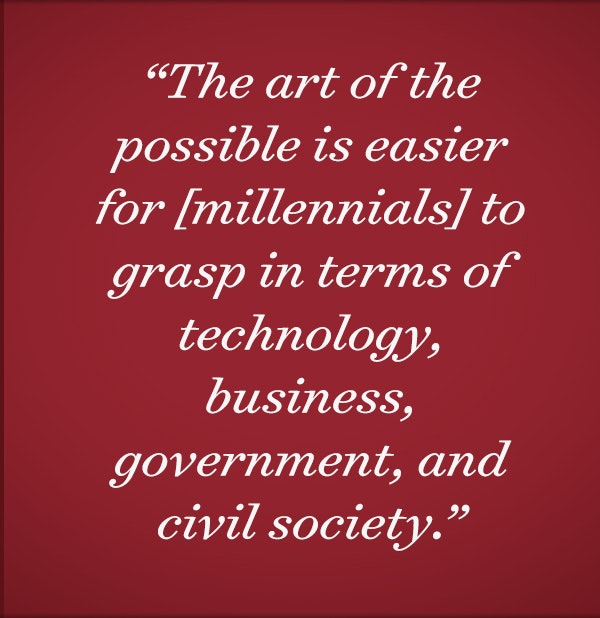
In a decade, augmented reality and merged reality are probably going to be pretty prominent. In my view, they will probably impact every corner of our society and every sector of our economy. It could be that Generation Z, the one coming behind millennials, has an easier time understanding this than millennials.
What will be the role of virtual reality and other emerging technologies? How do you see those disrupting, not only politics, but all aspects of society?
It will have a profound impact first on entertainment. Before too long you will basically be at a sporting event and potentially have whatever view you want. You could see what the quarterback or shortstop sees.
It will affect education as children could be transported to the moment, instead of reading about it, if the moment can be recreated properly, whether it is John Kennedy giving his Inaugural Address or George Bush with the megaphone outside of the Twin Towers in 2001.
In probably 10 years, the ability to have a presidential candidate in your living room is more likely than not. Some people think that when you are on an airplane you will have a pair of glasses and draw a movie screen as large as you want and have your own field of vision.
The smartphone and all the changes brought by smartphone technology will be matched by this world of augmented and virtual reality. It will start small and won’t affect everything, but it will have a profound impact.
This raises another interesting question for policymakers. We talk about the inequality that results when certain schools have great broadband and others don’t. What about when some have virtual reality and others don’t because it is very expensive? Some students who have this rich learning experience will be very advantaged.
Different policy questions also will arise. Millennials would more instinctively and quickly gravitate there. That is one of the challenges for government, both at the federal and state levels. Everything is changing so quickly. Governments will have to be much more agile and move more quickly.
That is one of the challenges for government, both at the federal and state levels. Everything is changing so quickly. Governments will have to be much more agile and move more quickly.
In some cases, they will have to accept technology as it is. In other cases, it will be to think through the right regulations.
These changes are coming with full force and a velocity that should not surprise us. The iPhone came out in 2007 and, look, the entire world has been fundamentally transformed by smartphones. The same thing is probably going to happen with augmented and virtual reality.
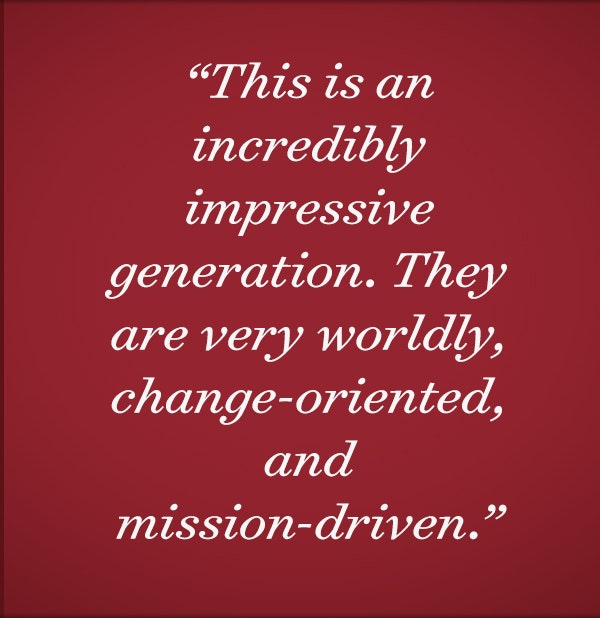
When you compare millennials to boomers, are we seeing something cyclical? Is the disruptive nature of millennials something we have seen before? Or is this a unique phenomenon?
My sense is there is more commonality than not. Every generation has a different perspective and experiences, but I don’t think this is a huge exception other than the shrinking of the planet through technology.
They have an intuitive sense and understanding of technology, and that may give them a little more of an impact.
Every generation has its own uniqueness. Thinking of my generation, I grew up with the view that you had to wait your turn. You would work at the same company for a long time and you would work your way up the ladder. I’m 48, so that was my generation.
That’s not what millennials believe. They want to live in many different places, especially in cities. They want to work in many different industries. They want to experiment. Those are pretty big changes. They are going to have 20 different careers and 40 different places of work. That is fundamentally different than all the previous generations.
What challenges stand in the way of millennials? Student debt? Federal debt? The environment?
They are a remarkable generation. They are inheriting some issues – the state of the planet from a climate standpoint, for example. Many of them are shouldering debilitating student loan debt.
But the world is their oyster and my only observation would be attention span. Everyone now thinks in short bursts and the skill of longer-form writing is becoming a lost art.
You could argue that doesn’t matter anymore because you can send text messages and tweets. But, the process of committing your thoughts to paper is pretty important to articulating an argument.
Yet, generally, I think this is an incredibly impressive generation. They are very worldly, change-oriented, and mission-driven. My hope is that we will all benefit from their leadership, but there is no doubt there are some thorny problems they are inheriting.
Part of the other reason they will hopefully apply some of their life to public service is that we need their help to fix all these things. My view is, the future is like clay, not like stone. Put your hands on the clay and try to shape it.




